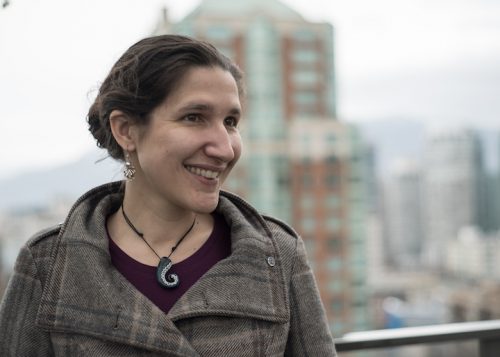What do television shows, outer space, earthquakes and journalism have in common? Ask Mika McKinnon, a Canadian-born geophysicist currently residing in the San Francisco area; she has consulted on the television series Stargate, written for science and tech publications like Gizmodo, and performed fieldwork on disaster relief. A self-named “Master of Disaster” and freelance scientist, McKinnon leads a career that touches on diverse areas of science and technology.
McKinnon knew she wanted to be a scientist from an early age. She spent her childhood voraciously questioning the world around her. She hoped to become an “oly-ologist”: “I knew that -ologists studied all the things, so I wanted to study all the things to find out what kinds of things to study,” McKinnon explains. It wasn’t until she went to university McKinnon decided to study geophysics. Encouraged by supportive professors and driven by her own desire to make a difference, McKinnon became a geophysicist and studied disasters and disaster relief.
But she ran into obstacles early on in her career. At the time, Canada had a freeze on new government research positions, as the economy was in a recession. It took a year for the newly minted geophysicist to find a full-time job, and the job she found openly acknowledged that they were hiring women to pay them less. “Which is illegal and problematic, but I needed the job,” she says. The job was less than ideal. “I do field work, [which] is an area…frequently outside of the standard protections. Sexism can be a lot more blatant. Threats can be a lot more blatant.”
In the midst of a strained political and social climate, McKinnon looked to mentors, friends and personal heroes for support and inspiration. “I am lucky that I have too many mentors to list in name,” McKinnon says. However, a personal hero of hers is Vera Rubin, the astrophysicist who discovered dark matter. Despite living in an era when women could not be primary investigators on a telescope, Rubin discovered dark matter, a mysterious substance hypothesized to make up almost a third of our universe. Beyond that, Rubin was a strong advocate for healthy families, telling workers in her lab to go home when they had children and always fiercely supporting other women in science.
McKinnon has followed in those footsteps. She has become a freelance scientist to advocate for potentially controversial political topics. She speaks out on green energy, greater awareness of climate change, disaster relief, and support for women and minorities in science. Now, her day-to-day life is both uncertain and exhilarating; with no nine-to-five career, she is free to pick jobs that she finds interesting and compelling. “Sometimes I’m doing government contract work. Sometimes I’m watching and reporting on rocket launches. Sometimes I’m on set. Sometimes I’m painstakingly going through databases trying to clean things up.” This may not have been the job she imagined while she was in college, but she is self-determined and able to keep her moral ground. Her outspoken viewpoints and her open involvement with media may have cost her job opportunities, but that’s a sacrifice she is willing to make.
Despite the challenges she has faced, McKinnon is optimistic about the future. “It turns out that scientists are just humans. They’re as flawed and as diverse as everybody else…But [some are] these brave powerful advocates on behalf of truth and justice and inclusivity.” She has a particular interest in the Canadian space program, which has been imbalanced historically but may soon hire a more diverse class of astronauts.
Featured Image: Courtesy of Dorien Gunnels

